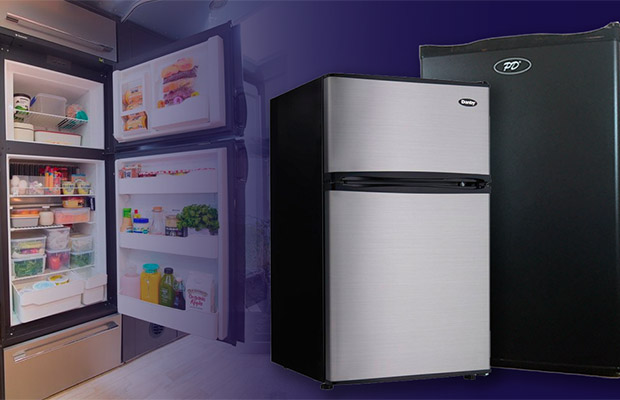Only we RVers get to enjoy the convenience of having a fridge while camping. Having more options available for meals is made possible by the ability to keep food cool. In fact, this may be the appliance that you use the most in your entire RV.
Fridges for RVs come in a few different varieties. The best RV refrigerator model for you depends on your RV size and lifestyle.
If you’re looking for an RV refrigerator? You are in the proper location! You can choose from the top 12 RV refrigerators on our list. Keep reading!
Table of Contents
Best RV Refrigerator List
- 1. Norcold Polar-Series 10 cu. Ft Compressor Fridge
- 2. RecPro 3-Way RV Fridge
- 3. Everchill Mini 12 Volt RV Refrigerator
- 4. Dometic RM 1350S
- 5. ICECO Dual Zone Portable Fridge
- 6. Dellcool 2 Way RV Refrigerator
- 7. SMETA 3 Way Fridge
- 8. Dometic CFX3 45 Powered Cooler
- 9. Dometic DMC4101 RV Refrigerator
- 10. Galanz Retro Top Mount Fridge
- 11. Dometic Elite 2+2 Refrigerator
- 12. Norcold NRF 30 Series Fidge Freezer
Best RV Refrigerator Review
1. Norcold Polar-Series 10 cu. Ft Compressor Fridge
Best for:
- Larger spaces
- Warmer temps
What people like:
- Stays cold
- Latched doors
- Powered by 12V DC
- Stainless steel doors
What people don’t like:
- Not the most durable long-term
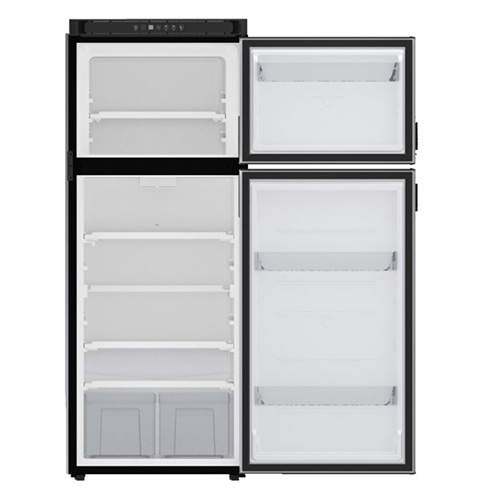
The entire 10 cubic feet of space inside the Norcold Polar-Series RV refrigerator is reliably cooled and frozen. The majority of us have compressor refrigerators like this one in our homes. Compared to standard RV refrigerators, which use absorption cooling, compressor refrigerators are known to be much more reliable.
Whether you’re in a summer desert or a snowstorm, this fridge will keep your ice cream frozen.
The doors have latches so they won’t fly open while you’re out camping. Furthermore, if you’re looking for a more contemporary RV interior, the stainless steel appearance fits.
Only 12V DC power is used to power this one-way compressor refrigerator. As a result, your RV’s electrical system will be able to power it without a problem.
2. Recpro 3-Way RV Fridge
Best for:
- Off-grid RVing
What people like:
- Multiple power options
- Controlled temperature settings
- Separate freezer compartment
- Latching door handles
- Reversible doors
What people don’t like:
- May not work the best in really hot weather
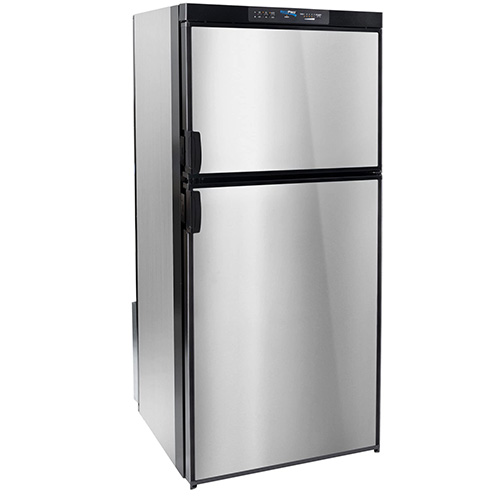
If you want your RV refrigerator to be powered in a variety of ways, the RecPro 3-way fridge is fantastic. It can be powered by propane gas, 12 V or 120 V electricity. This means that you will be able to use a fridge whether you have solar power, shore power, or just propane.
6.3 cubic feet are available in this refrigerator. It’s a medium-sized RV fridge, in my opinion. It has unquestionably got enough space to keep food cold or frozen for a couple of people for about a week.
The temperature settings are adjustable, and the door handles have latches so they will never swing open while being transported. The doors on this refrigerator can be reversed. According to how your RV’s kitchen is configured, you can change the door to open either right- or left-handed.
The refrigerator uses absorption technology, which might struggle to maintain a cool temperature when it’s hot outside. I would keep that in mind if your RV lacks air conditioning.
3. Everchill Mini 12 Volt RV Refrigerator
Best for:
- Smaller spaces
What people like:
- Easy to install
- No power inverter needed
- Glass shelves
- Low power draw
- Cools very quickly
What people don’t like:
- Very small freezer compartment
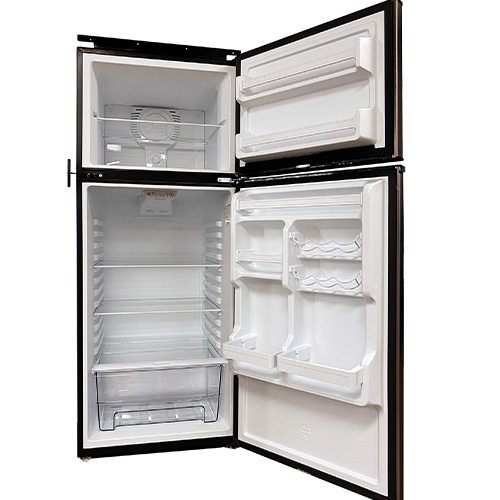
Since this Everchill refrigerator only has 3.5 cubic feet, it is ideal for any smaller camper or for people who don’t require a sizable refrigerator. You won’t have to worry about your battery running out if you’re off-grid because of the small size and extremely low power draw.
This RV refrigerator has a produce drawer and three glass shelves inside. In the door, there are also some shelves for drinks.
Only 3.5 cubic feet are contained in the freezer of the Everchill. and is very small. While it does maintain a very cold temperature, its size is probably limited to an ice cube tray or one or two frozen meals. A few pints of Ben & Jerry’s won’t fit in this fridge, which is a shame.
It is incredibly simple to set up and install, and since it operates on 12V DC, you can plug it directly into the power grid of your RV without the need for an inverter.
It also has adjustable legs, so you can raise and lower them to get a nice snug fit if it doesn’t fit exactly into the space you have for it.
4. Dometic RM 1350S
Best for:
- RVers who need a fridge and freezer with a large capacity
What people like:
- Two-door for a residential-style feel
- Automatic door-locking system
- Digital temperature display
- Ice maker
What people don’t like:
- Expensive
From Dometic’s line of RV refrigerators, the RM 1350S is a 13 cubic-foot absorption refrigerator. It’s one of the biggest refrigerators you’ll find on the market and the biggest RV fridge Dometic offers.
It is a two-door refrigerator (technically a four-door refrigerator because there are two doors on the freezer and two doors on the fridge). It feels more like a residential refrigerator because of the doors. Additionally, an ice maker is located in the freezer.!
An extended family who cooks frequently could fit comfortably in this space. And for this to fit, your RV will likely need to be quite large.
The patented automatic door locking system by Dometic is one of the many great features included in this refrigerator. You never have to worry about forgetting to lock the refrigerator doors because they are locked automatically when the RV’s ignition is turned on.
It will cost you even though this refrigerator is excellent. At the time I’m writing this, the cost is over $6,000!!! However, if your budget allows it, it’s a fantastic luxury to have in your RV.
5. ICECO Dual Zone Portable Fridge
Best for:
- Smaller RVs and campers
What people like:
- Quiet
- Sleek look
- Low power draw
- Two cooling compartments with separate temperature controls
- Very high quality
What people don’t like:
- Not big enough for larger families
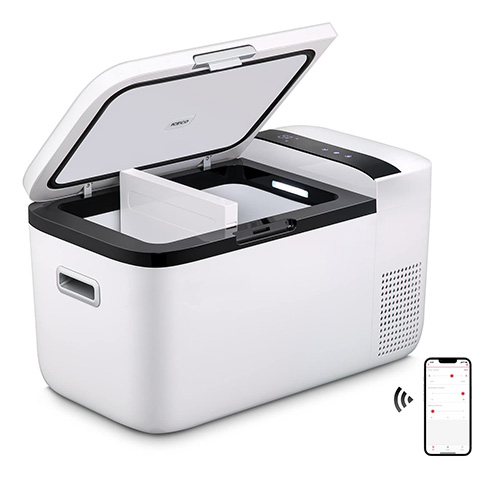
The ICECO fridge is intended for off-grid camping in campervans, small campers, and trailers. With independent temperature controls, it has two compartments. That means one can be at “fridge” temp, while the other is at “freezer” temp.
Actual customers claim that using this fridge while off-grid allowed them to keep ice cream frozen for days. It is extremely power-efficient and quiet. If you need to conserve energy, you can also turn off only one side of the cooler.
I adore how stylish this cooler is. It’s made to be incredibly durable and will last you a very long time.
Just over 2 cubic feet is the approximate capacity of this refrigerator, so it won’t hold enough food to feed a large family. Keep that in mind.
6. Dellcool 2 Way RV Refrigerator
Best for:
- RVers on a budget
What people like:
- Very quiet
- Energy efficient
- Electric thermostat
- Powered by 12V or 120V
What people don’t like:
- No freezer compartment
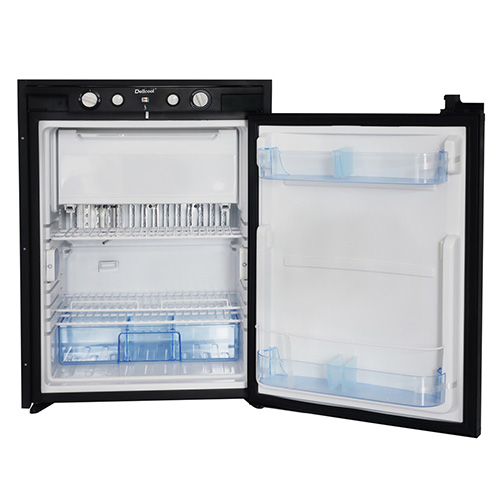
The cost of an RV refrigerator can be very high. Some of the items on this list cost more than $6,000. This fridge from Toolots, however, will do the trick if you’re on a tight budget and only need a refrigerator.
This refrigerator uses absorption cooling. Compared to compressor fridges, absorption-style refrigerators typically do not cool as effectively. However, the manufacturer of this refrigerator claims that it can withstand temperatures of up to 90 degrees outside. Therefore, it should stay cool as long as you aren’t in an extremely hot area.
Small in size and extremely quiet, this refrigerator. It also has a very low energy draw due to its small size (1.9 cubic feet capacity).
There is no freezer section in this refrigerator. Therefore, if you must have that, this model might not be for you.
7. SMETA 3 Way Fridge
Best for:
- Off-grid camping
What people like:
- Versatile power options
- Very compact
- Lighting inside
- Low energy consumption
What people don’t like:
- No freezer
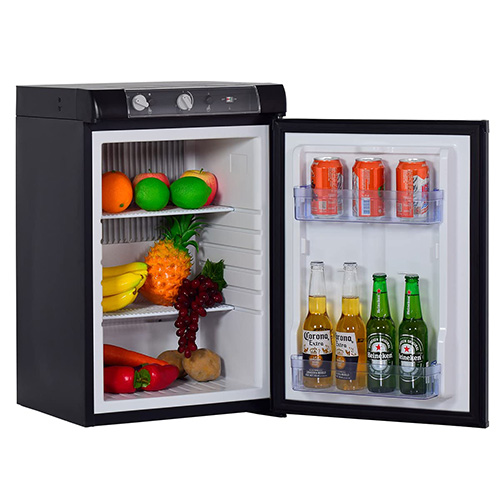
If you only need space to chill creamer for coffee, fresh fruit, or a few drinks, this SMETA refrigerator’s 2.1 cubic foot capacity is perfect.
Propane, 12V, or 120V electricity are the available power sources. Due to the fact that this refrigerator uses absorption, extremely hot temperatures may cause it to malfunction. However, it is very silent, so you most likely won’t be able to hear it running.
If you really want ice cubes in your water, there may be a better option for you since this refrigerator does not have a freezer section.
8. Dometic CFX3 45 Powered Cooler
Best for:
- Outdoor use
- Smaller RVs and campervans
What people like:
- Great quality
- The phone app and Bluetooth connection
- Doesn’t use a lot of electricity
- Durable
- Easy to set up
- Sleek look
What people don’t like:
- Pricey
For use outdoors and while backpacking, Dometic offers the CFX3 45, a compact but capable compressor RV refrigerator. Its internal volume is 46 liters, and it can accommodate 67 cans. If you have solar, it has a very low power requirement and will cool for however long you need.
You can manage the temperature and keep an eye on performance using the CFX3 app that Dometic offers. This is extremely simple to set up and makes using this fridge very convenient, according to actual users.
It’s powered by either 12V electricity or 120V, so whatever power source you’ve got in your camper, this fridge will be compatible
It won’t be able to freeze and cool everything you need for a whole family because this cooler isn’t very big. This is a great little fridge, though, if you have a smaller RV or frequently go backcountry camping.
9. Dometic DMC4101 RV Refrigerator
Best for:
- Warmer temps
- Large families
What people like:
- Energy efficient
- Sleek style
- Digital control panel with varying cooling modes
- No lock necessary–has a latching handle
What people don’t like:
- Uses 12V DC power only
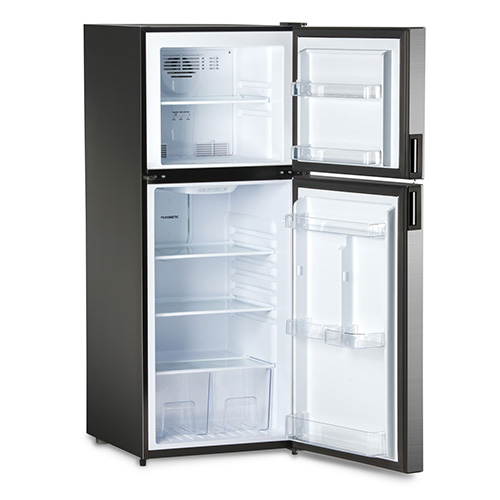
The top-of-the-line refrigerator for RVs is the Dometic DMC4101 model. Almost any RV kitchen can accommodate it due to its large capacity and compact footprint.
The compressor technology is the best feature of this refrigerator. Comparing compressor cooling to absorption refrigerators, the former is more effective and potent. The items inside the refrigerator will remain chilled no matter the outside temperature.
This fridge has two produce “crisper” drawers and a separate freezer section. There is a digital control panel with modes to improve energy efficiency or lessen noise.
This stylish refrigerator also does not require locking; the doors open using a latch mechanism that will remain latched while you are driving.
Since it was designed for RVs, this refrigerator only requires 12V DC power. This is fantastic if you typically use shore power, but if you also want the option to use propane, this fridge might not be for you.
10. Galanz Retro Top Mount Fridge
Best for:
- Style-inclined fridge shoppers
What people like:
- Roomy but has a small footprint
- Energy-efficient compressor cooling
- Adjustable leveling legs
- Glass shelves
- The light inside the fridge compartment
What people don’t like:
- Not made for RVs so you’ll need to use an inverter
I adore this Galanz refrigerator if you want a retro-style refrigerator but don’t want to spend the money on an expensive SMEG. Considering that it is available in a variety of colors, it will look absolutely adorable in any RV interior.
But aside from its appearance, this fridge is a lot of fridge for the money. It has a fairly sizable separate freezer compartment and offers consistent cooling. The fridge looks nice on the inside because it has glass shelves and a nice interior light.
From 4 to 10 cubic feet, there are several sizes available for the Galanz refrigerator. Therefore, the Galanz fridge should fit in whatever space you have in your RV for a fridge.
The fact that this fridge is a residential one is the only drawback. To change your 12V power to 120V for the fridge, you’ll need to use an inverter. Nevertheless, the refrigerator does have individually adjustable legs, allowing you to level it wherever you are.
11. Dometic Elite 2+2 Refrigerator
Best for:
- Large storage capacity
What people like:
- Lots of space
- Convenient rack system
- eco-friendly refrigerants and lighting.
What people don’t like:
- Expensive
- Heavy and large in size
- Door panels are not included.
You likely require the same amount of space in your refrigerator at home as when going camping with the family or residing in an RV.
The refrigerator with two doors has a ton of space. The number of shelves and trays, however, is what really allows you to make good use of that space, not just the amount of available rooms.
12. Norcold NRF 30 Series Fridge Freezer
Best for:
- Small and light
- Inexpensive
- A good option for solo trips and short trips
What people like:
- Space is low
- If exposed to hot temperatures or direct sunlight, the plastic exterior may warp. But that’s just how plastic is.
What people don’t like:
The Norcold NRF30 is small, stylish, and tough enough to do the job if you only need a small space to pack enough food for a short camping trip.
It is specifically made to lessen battery drain and operates on a 12/24V DC power supply.
To regulate how much power it uses, you can set three power draw levels. It only consumes 63W at most.
The handle makes it easy to carry around because it is lightweight and small. That makes it the ideal multi-purpose refrigerator. Use it in your garden or transport it in your RV or vehicle.
Despite its size, it has tough steel interiors and a tiny freezer compartment for frozen foods.
Different Types Of RV And Camper Fridges
You might not know what the heck all the terms mean when you see refrigerators in stores that are powered in various ways. Here is a brief explanation of what you’re looking at, along with the advantages and disadvantages of each.
12V Electric Compressor Refrigerators
Although residential refrigerators tend to use compressors more frequently, RVs do occasionally use 12V compressor refrigerators.
They operate by adjusting a refrigerant’s pressure and forcing it through coils. Pressure and state (from liquid to gas and back) are changed as the refrigerant passes through the coils. Cool air is produced by this reaction.
12V fridges are great for RVs since you won’t need an inverter to convert the 12V power to 120V and will only use electricity (not propane). Your RV’s battery will be used to power it.
These refrigerators are more space-efficient when compared to an absorption refrigerator, which is another popular choice. They don’t need very much insulation. Additionally, they use a little less energy.
Pros:
- Uses only electricity
- Doesn’t require an inverter
- Consistent cooling
- Energy efficient
Cons:
- Pricey
- Requires a good amount of electricity (not the best for boondocking)
Two Or Three-way Absorption Refrigerators
The kind of refrigerator you’ll find in RVs most frequently is an absorption one. A refrigerant changes from liquid to vapor to liquid using a chemical reaction that is sparked by heat. Cool air is produced by the procedure.
The heat required to start the refrigerant reaction is the component of absorption refrigerators that consumes energy. Propane, 12V, and 120V electricity are all possible sources of this heat.
A two-way absorption refrigerator will use propane or 12V electricity. The refrigerant reaction in a three-way absorption refrigerator can be started using propane, 12V electric power, or 120V electric power. It cannot function solely on propane since the circuitry is powered by electricity.
Pros:
- Great for off-gridding: the ability to use propane gas means you won’t need a ton of electricity
- Multiple ways to power
- Well-insulated
Cons:
- Usually smaller
- Not great consistent cooling
- RV needs to be level for the fridge to be able to run
Propane Absorption Refrigerators
Similar to two-way and three-way absorption refrigerators, propane refrigerators use an absorption cooling system. The only distinction is that these can only be powered by propane.
There are propane-only options available, though they are not very common. These are advantageous if you frequently boondock and lack solar power because they consume zero electricity. To avoid going without a refrigerator, you must, however, make sure that you always have propane on hand.
Pros:
- Doesn’t need any electricity
- Propane is inexpensive
Cons:
- Not versatile (can only run with propane)
- Need to make sure you always have propane on hand
120V Residential Style Refrigerators
Your home has a 120V residential refrigerator. Most air conditioners use a compressor to force refrigerant through various coils as they cool. In comparison to absorption cooling, compression cooling is more reliable and effective.
The benefit of having a residential-style refrigerator in your RV is the freedom to choose the size of the refrigerator. (As long as it fits.)
Therefore, a residential-style fridge can accommodate however much ice cream, frozen food, or cold beverages you like to keep on hand.
The 120V power does imply that you’ll need to put the 12V power in your RV through an inverter.
Pros:
- Very consistent cooling
- Any size fridge you want
Cons:
- Not designed to be used in RVs
- Need to use an inverter
Thermoelectric Coolers
In contrast to compressor and absorption fridges, thermoelectric coolers don’t use refrigerants to cool. They operate instead by rearranging electrical currents. Warm air is drawn to one end of the moving current (outside the refrigerator) and cool air is drawn to the other end (inside the refrigerator).
In comparison to compressor cooling or absorption cooling, this method does not produce as much cool air. Therefore, freezer compartments are not included with thermoelectric coolers. They are also smaller because a large space cannot be effectively cooled by a thermoelectric current.
Pros:
- Inexpensive
- Small
Cons:
- High power draw
- No freezer compartment
Factors To Consider When Buying A New RV Fridge
We’ve found some of the best refrigerators, so check them out if yours isn’t working after trying troubleshooting methods or if you just want a new one.
However, the right fridge for you will vary based on:
- Size
- Capacity
- Options
- Price
Let’s discuss each.
Size
You will have a different size fridge depending on the size of your vehicle. To ensure that you purchase the correct size unit, you must measure the space.
To view the Norcold conversion chart if you’re replacing an old refrigerator, click here.
To find your replacement, hit “Control + F” (or “Command + F” to Enter your model number after typing (Mac) on your keyboard. When looking for a replacement, it will display the size of your refrigerator.
Related Reading: How Much Does A Refrigerator Weigh?
Capacity
Similar to regular refrigerators, RV refrigerators come in different sizes and have different amounts of food storage space.
Figure out how much you actually need, then purchase based on that.
Buy a mini fridge if you require more freezer or food storage space. The majority of them are powered by AC or DC power, and you can set them up outside while camping so you won’t have to go inside to get a drink.
They’re especially useful if you have a small RV and don’t want to invest in a cooler or ice chest that requires fresh ice all the time to store extra food.
Options
Options vary depending on the RV refrigerator. Making the right decisions can help you save a lot of money!
For instance, some people require ice makers and two-door refrigerators, while others could care less. You get to make the decision!
Price
It costs a lot to buy a good RV refrigerator. They start at around $1,100 and can cost up to $3,000 or more for luxury models.
Because they are made of stainless steel rather than the plastic components found in residential refrigerators, which must withstand the constant rumble of the road without disintegrating, RV refrigerators are more expensive.
Consider purchasing refurbished if you want to cut costs. A dud purchase should be avoided, though! Before purchasing a model, make sure to test it out.
Fridge Tips & Tricks
Congrats, you succeeded!
Before we go, here are a few tips & tricks to keep your new fridge running efficiently and make sure it lasts a long time:
- The evening before leaving, start your refrigerator. This gives the refrigerator enough time to reach the proper temperature and be prepared to hold food.
- Only store foods that are frozen, cold, or at room temperature in your fridge. It requires a lot more energy (and time) to cool warm foods.
- Foods should be separated by space. Food cools unevenly and the fridge has to work harder when it’s crowded because it can’t move as freely.
- Purchase a battery-powered RV refrigerator fan. They can cut your cool-down time by as much as 50%, which is awesome!
- Keep the fridge door closed a lot of the time. To keep food safe, you need to keep it between 34 and 36 degrees (or 0 and 10 degrees in the freezer). Food can spoil at any temperature over 40 degrees, and if you leave the door open, it can happen quickly.
- Get a thermometer. You can rest easy knowing your refrigerator is functional and ready to store food by keeping a thermometer in it!
- Defrost your freezer once or twice a month. Frost accumulation can limit the space in your freezer and be a pain. Allow the refrigerator to thaw after turning it off completely. A pan of hot water should be placed in your freezer to hasten the process.
- For proper operation, your refrigerator must be level. It will be harmed if you use your refrigerator at an angle. To make sure you’re ready to go, place a bubble level on it.
- Even when you are not RVing, run your refrigerator every so often. There are sediments in the liquid chemicals, and when your refrigerator isn’t running, they settle on the bottom and create clogs that can harm the appliance and impede cooling.
- Before and after every trip, check the front and back vents. The smooth operation of your rig (and fridge) can be extended by performing routine maintenance like this.
- If possible, park with your outside vent in the shade. Your refrigerator’s performance may be impacted by the weather outside. The refrigerator will stay cooler and not have to work as hard if the back is shaded.
- Check to see that the seals close properly. The refrigerator’s door seals should be examined after each trip, just like all the other seals on your vehicle, and should be dusted with baby powder every few months to keep everything tight and functional.
- To keep things in place, purchase some expandable refrigerator bars. Nothing is worse than setting up camp only to discover that the refrigerator has been ruined by spilled food.
RV Refrigerator FAQs
What Is An RV Fridge?
Any fridge that functions in an RV is referred to as an RV refrigerator. Refrigerators used in recreational vehicles typically have a smaller capacity than refrigerators used in homes and use propane or 12V electricity instead of 120V electricity to power them.
If you have a 12V to 120V inverter and sufficient space, you can install a residential-style refrigerator in an RV.
Why Are RV Refrigerators So Expensive?
To withstand the rigors of life on the road, RV refrigerators are built tough. To withstand the constant movement of a moving vehicle, they are constructed with sturdy materials.
Even when powered by 12 volts, they have thick insulation to keep them cool.
They can also be powered by propane, 12 volts, or AC power because they have a variety of fuel options.
RV refrigerators cost more than residential models due to these features. However, the peace of mind that comes with knowing a fridge will hold up to anything that life on the road has to throw at it is worth the price for many full-time RV owners.
How Does An RV Refrigerator Work?
There are numerous ways that RV refrigerators function. Both propane and electricity, or both, can be used to power them. Some use absorption refrigeration, which changes the phase of refrigerants and releases cool air as a result.
Similar to this method, compression refrigeration forces the refrigerant through coils by altering its pressure, releasing cool air. Using a current to release warm air on one end and cool air on the other, thermoelectric cooling is used by some.
Will RV Fridge Run Off The Battery When Driving?
In an RV, a refrigerator can operate while moving along on battery power. In fact, switching to battery charging (or off) is a safety requirement if you typically run your refrigerator on propane.
Does An RV Refrigerator Operate More Efficiently On Gas Or Electricity?
A fridge operates more quickly on gas, but on electricity, it keeps it cold for a longer period of time. However, in higher temperatures, gas refrigerators do lose some of their efficiency.
Conclusion
Which RV refrigerator is best? Will you splurge and go for the residential-style Dometic DMC4101? The Dellcool 2-way fridge may be your choice if you want to keep it compact.
Although choosing an RV refrigerator may seem tedious, it may end up being your most-used kitchen appliance.
More Food Storage Posts:
